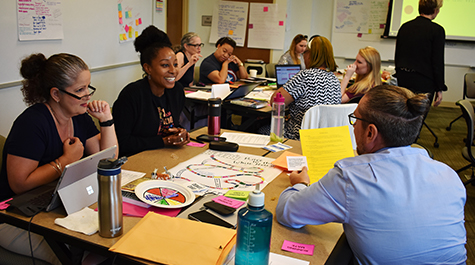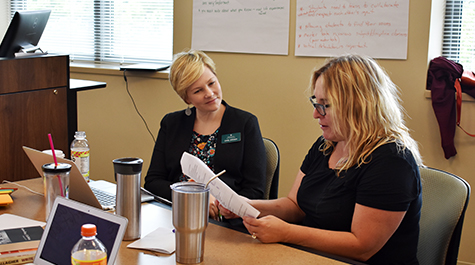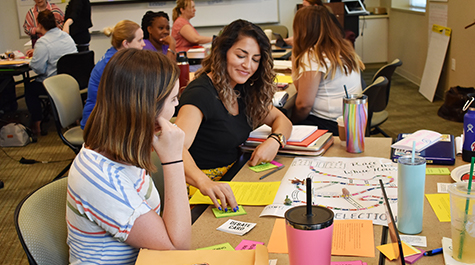Even teachers need to practice writing
Writing is a difficult skill to master, and an even more difficult skill to teach. But by practicing their own writing skills, educators can become better writers and, in turn, better writing teachers. Connecting the dots between the essential need for students to develop writing skills and the work of developing writing curriculum has been the focus of the Eastern Virginia Writing Project (EVWP) at William & Mary’s School of Education for more than 40 years.
W&M is one of nearly 200 universities from every state and U.S. territory that partners with the National Writing Project (NWP), offering professional development workshops to assist teachers in strengthening their own writing skills and evolving their writing programs. The Eastern Virginia Writing Project is one of five Virginia sites. Founded in 1979 by James Beers, former associate professor and site coordinator, it continues to be one of the longest running community engagement centers at the School of Education.
Lindy Johnson, assistant professor of English education, became the site director two years ago and is a passionate advocate for the program because of its demonstrated success in supporting teachers in the classroom. “The Eastern Virginia Writing Project is a space for any teacher who wants to come and be lifted up and affirmed in their work,” she says. “The time-honored principles and practices of the work sustain educators and lead to transformations in teaching and learning."
The NWP has worked tirelessly for more than four decades to provide professional development support to teachers and re-inspire a love of teaching. Virginia high school English teacher Nicole Throckmorton M.Ed. ’03 was so inspired by her experience at EVWP in 2005 that she returned to the program the next summer as a teacher leader, working alongside the site director to guide and encourage other teachers to develop their writing and teaching skills. “EVWP gave me the tools and the confidence to change my approach to writing instruction in the classroom, and it also allowed me the room to find my own voice as a writer,” she says. “Finding my own voice gave me insight into helping my students find their own voices.”
The program’s sustainability lies in its flexibility to incorporate new theory, research methods and modes of communication over time while still adhering to its core principals. With an emphasis on learning and developing writing skills for all grade levels and subject areas, the program has been successful in partnering with institutions of higher education that provide resources and research along with the support and encouragement of its community of peer educators.
Grace Rivera, a two-time Newport News Public School Teacher of the Year and EVWP teacher leader, de- scribes the program as the single best professional development opportunity she has ever been a part of. “The vulnerability of sharing writing with a teacher or a group, the struggle of coming up with the right thing (or anything) to say, and the nervous and thrilling excitement of sharing what you have written all led me to rethink my own practices as a teacher,” she says. “The teaching demonstrations created by my fellow participants inspired me to want to try new strategies with my students and to rethink my own practice even further. I went back to start the school year invigorated and enthusiastic, and once I started seeing increased motivation and improved writing from my students, it was only natural that I start sharing my successes with other teachers in my building.”
Participants attend a week-long summer institute where they engage in interactive workshops to become better writers and learn new strategies for teaching students how to write. After presenting the new techniques they have learned in groups, they return to their classrooms with new lesson plans ready to engage their students in mastering their writing skills. The teachers have the opportunity to demonstrate lessons learned to other educators during a mini-conference held at the School of Education each fall.
Next year, the EVWP plans to expand the institute, offering students the chance to practice their writing skills through the NWP’s youth writing camp.


